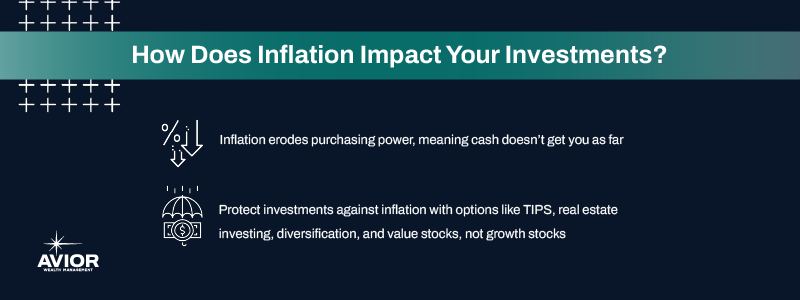How Does Inflation Impact Your Investments?
Rising inflation rates impact prices and purchasing power and may also impact the value of your investments.

One concern that may not be on your mind as you’re wealth planning is inflation. But inflation impacts a wide variety of financial considerations, including the investment choices you make.
Inflation is how much the economy increases prices each year for the average cost of goods and services. The inflation rate signifies the rate of rising prices, such as food, gas, and vehicles. But beyond upticks in prices at the grocery store, inflation also impacts your investments and can cause significant losses over time.
Because its impact is often underestimated in investment decisions, many investors overlook how it can erode investment value. Inflation affects many different types of assets, so understanding exactly how will help you meet your long-term financial goals.
The erosion of purchasing power
The first step is understanding the difference between the nominal and real rates. If your investments were to grow solely with the interest rate, minus inflation adjustments, that would be the nominal interest rate. However, the real interest rate factors in inflation. This is the nominal rate minus the inflation rate, which shows how much purchasing power you’re gaining or losing.
This is one reason interest rates fluctuate so much and may change more drastically when inflation is high. The government raises interest rates to overtake inflation rates, meaning investments see real interest returns. This happened recently when the Fed raised interest rates to account for high inflation post-pandemic.
In addition, there’s the simple fact that your cash doesn’t get you as far when prices are higher, which limits your purchasing power. The Fed aims to keep inflation at 2%, but that number was much higher in recent years.
How inflation impacts different asset classes
Because of the way real interest rates work, certain investments hold up better than others when inflation rates rise. Investments with lower interest rates can be hit harder by inflation since, to earn enough in returns, interest rates have to increase more than inflation is increasing.
The biggest area of weakness here is cash – your savings with no interest accumulation. It takes the hardest hit since prices are increasing to cover costs of daily living, but that cash isn’t seeing any growth at all.
Fixed-income investments, like municipal bonds and CDs, can also see lower real returns because of inflation. These investments can be safer and provide more stable returns. But because interest rates are more stable and income stays the same until the investment matures, inflation can cause the purchasing power of these to decline over time.
Stocks can also see negative impacts from years with high inflation rates. The goal is for company revenue to increase along with inflation, but you could see a lower rate of return with your stocks than the high interest rate, leading to negative actual returns.
Strategies to hedge against inflation
Inflation will happen no matter what kinds of investments you pursue. However, selecting investments with more protection can help you limit your losses related to inflation.
There are a few types of investments that stay protected against rising inflation rates, in addition to strategies you can use to ease the impact. Let’s look at a few tactics to consider for your investment portfolio:
1. Treasury inflation-protected securities (TIPS)
One common one is Treasury inflation-protected securities (TIPS). Return rates are adjusted by the government and are based on the consumer price index (CPI). So, TIPS can give you more reliable returns.
2. Real estate investing
With real estate investments, inflation doesn’t always have as big of a negative impact. The hope is that rent will increase along with inflation so that profits and distributions also increase, but increasing demand in the real estate market can mean that growth outpaces the rate of inflation. So, looking to real estate for inflation protection can be a good hedging tactic.
3. Diversification
Your portfolio needs to have a lot of diversity to protect against all kinds of losses and market swings, including inflation rate increases. Diversifying your investments gives you a mix of asset classes so one will hold up when another will not, yet you can still take some risks to see more growth potential.
4. Value stocks and commodities
Consider exposure to value stocks and commodities to protect against inflation. Value stocks are companies that have been undervalued in the market, and they can give you solid performance against rising inflation rates.
Commodity investments like oil and precious metals, including gold, can still provide high performance in times of high inflation. The demand for these types of assets may increase, which can bode well for hedging inflation.
5. Limit growth stocks
When you invest in growth stocks, you’re likely investing in companies that are growing quickly but not necessarily very profitable. Because interest rates are often boosted to bring down high inflation, growth stocks aren’t great options for combating inflation.
These perform best when inflation is low. Discounted cash flow models are used for these kinds of stocks, predicting these companies’ future earnings, so high interest rates mean less value assigned in these models.
Protecting investments from high inflation with Avior
When the inflation rate rises, your investments could lose value and lower purchasing power. Being aware of the risks and diversifying your portfolio with certain investments that hold up well against inflation increases can help you keep growing your investments.
When you work with Avior, we help you incorporate inflation considerations into your long-term wealth management plan. Contact us today to get started with a financial advisor.
Disclaimer: Nothing contained herein should be construed as legal or tax advice. Avior and our Advisors will work with your attorney and/or tax professional to assist with your legal and tax strategies. Please consult your attorney or tax professional with specific legal and/or tax questions. Investment Management and Financial Planner are offered through Avior Wealth Management, LLC, an SEC-registered investment advisor. Past performance is not a guarantee of future results. Investments are subject to loss, including the loss of principal.
No Comments
Sorry, the comment form is closed at this time.




